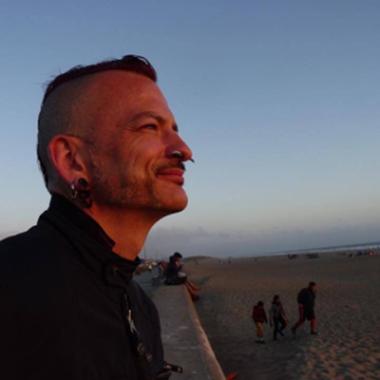About me
Steve gained a BSc (Hons) in Biotechnology from the University of Reading (1991). Later he retrained, achieving a BSc (Hons) in Nutritional Therapy from the University of Westminster (2003). He then developed an interested in the pedagogy of the development of students in Higher Education and gained a Masters in Higher Education with the University of Westminster (2012). A BANT registered practitioner of Nutritional Therapy, and Fellow of the Higher Education Academy, Steve has wide experience in developing education and training programmes for Life Science students, Health Science Students, and Healthcare practitioner students.
As part of the Nutritional Therapy Teaching Team, and Teaching-Clinic Supervision Team, at the University of Westminster (2004-2014), Steve lectured/tutored in Physiology, Biochemistry & Phytochemisty, Therapeutic Relationships and Reflective Practice; he was also Supervisor for Dissertation students (academic side), and Clinic Supervisor for Student-Practitioners (clinic side). Steve was interested at this time in designing teaching programmes that brought together the best from traditional sources and from western science, integrating critical thinking about both these sources into CAM practice.
From 2014 onwards, Steve continued as part of the teaching team for Human Physiology, and lectured in various modules on Nutrition as a therapeutic approach to increase health and wellbeing. In 2015 Steve became Course Leader for the BSc(hons) Western Herbal Medicine. Working with student-practitioners (initially of Nutritional Therapy, later of Western Herbal Medicine), Steve focused on supporting these students to develop practices of embedding evidence-based theory into their therapeutic approaches, and supporting them to develop skills as reflectively self-developing professionals able to actively engage in collaborative practice between healthcare providers.
In 2021 Steve stepped away from the Herbal Medicine BSc(hons) course and became Senior Tutor for the School of Life Sciences supporting a team of Personal Tutors in their delivery of pastoral and academic support to a cohort of approx. 3000 students L3 to L7.
In that year Steve also became Course Leader for Foundation in Life Sciences; this course includes the Foundation years of the BSc (hons) courses: Biochemistry, Biological Sciences, Biomedical Sciences, Human Nutrition, Pharmacology and Physiology. Steve has interest is in supporting student-practitioners of various kinds to integrate rigorous science and critical thinking into their holistic therapeutic practices, lab-based work, and research work. Also, to support students of these areas to engage in collaborative practice across specialist bioscience and health science areas, and between CAM and allopathic healthcare providers.
As an educator, Steve's current focus is around the provision of foundation courses that improve access to the undergraduate programmes at the University of Westminster; and wider if students choose to transfer onwards. As part of that focus, he is interested in grounding learning in lived experience, and in the transformational learning processes of mentoring, supervision, and preceptorship across a range of subject areas. Finally, Steve’s central approach to teaching and learning is in the value that reflective practice has in enabling the development of self-directed student-learners and professionals.
Teaching
Senior (Personal) Tutor for the School of Life Sciences
Supporting a team of Personal Tutors in their delivery of pastoral and academic support to a cohort of approx. 3000 students L3 to L7.
Co-Course Leader: Foundation for Life Sciences (L3).
Lecturing, Tutoring, and Assessing in modules: - Chemistry, Biology, Introduction to Physiology, Bioscience in Action.
Co-Module Leader: Professional Development for Leadership (L7).
Lecturing, Tutoring, and Assessing in skills/subjects: - Professional Relationship theories, Reflective Practice, and reflective group Facilitation for Professional Development. Group Facilitator of Peer Reflective Groups for the purposes of reflective exploration of professional practice experience: turning experience into learning & professional development.
Other Lecturing (current and past).
Cell Biology (L3): Teaching basic cellular structure and function to support understanding of physiological systems later in the programmes of study.
Human Physiology (L3 to L4): Supporting the synthesis of information from lectures and texts, into working knowledge relevant to student degree pathway.
Pathophysiology of infections (HIV / Hep C particularly) (L4 to L6): for both Nutritional Therapy and Herbal Medicine student practitioners.
Nutritional Therapy (L3 to L7): for Nutritional Therapy Practitioners, Chinese / Western Herbal Medicine Practitioners, other Nutrition profession students, and Osteopath students.
Therapeutic Relationship / Professional Relationship (L4 to L7): Transactional Analysis & Karpman Drama Triangle, Rogerian Core Conditions, Transference & counter transference – to support practitioner/professionals to better understand their own responses to situations/interactions, and to thereby be better able to self-manage their professional relationships.
Reflective Practice (L3 to L7): various models used to support students to be able to gain insight into their experiences, leading to increased ownership of their direction of studies during the delivered teaching programmes, and later as professionals to gain improved self-direction in continuous professional development.
Research
(Interests only - No current work-in-progress)
Teaching approaches and methods for engaging Life Science students, Health Science Students, and Healthcare practitioner students in science subjects.
Developmental process of reflective learning of students to practitioners – the value and place of tutoring / mentoring / supervision / preceptorship processes.
The use and effectiveness of various assessment methods in supporting the transformational development of students into practitioners.
